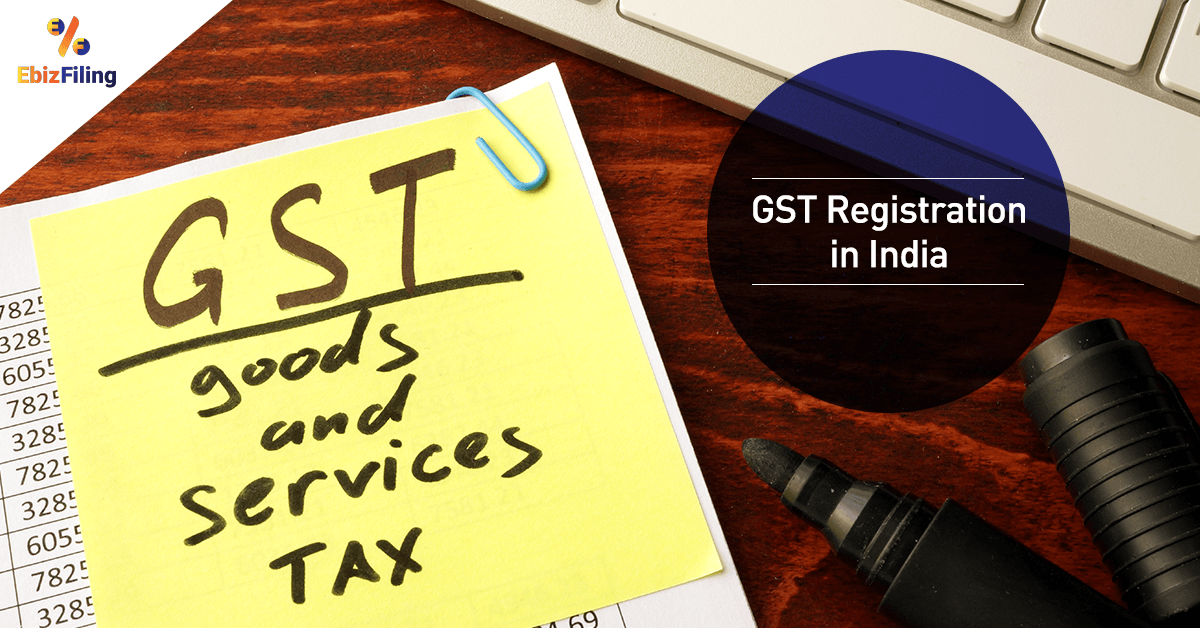
-
July 14, 2025
GST Registration in India
As GST is already introduced in the Indian tax regime, it’s high time for GST registration in India. While many businesses have enrolled/migrated to GST, many are yet to register. The window for enrolment and new registrations is re-opened by the government. If you are yet to register, ebizfiling.com offers quick registration for Goods and Services Tax also, know the latest update on GST registration exemption limit.
Every business carrying out a taxable supply of goods or services under GST regime and whose turnover exceeds the threshold limit of Rs. 20 Lakh (or Rs. 10 Lakh as applicable in North Eastern states) will be required to register as a normal taxable person. This process of registration is referred to as GST registration.
Latest Update on GST registration exemption limit:
According to latest announcement on GST registration exemption limit via a tweet, Businesses with an annual turnover of up to Rs 40 lakh are exempted from GST. Additionally, those with a turnover up to Rs 1.5 crore can opt for the Composition Scheme and pay only 1% tax.
However, for services the GST registration exemption limit of turnover is still 20 lakhs. Also, service provider having turnover up to 50 lakhs can opt for composition scheme for services and pay only 6% of tax.
There is one more update in GST registration where now you will need Aadhar authentication to get GST registration. Know the full details at: Aadhaar made a mandatory requirement for GST registration
This post is our sincere attempt to provide knowledge regarding GST procedures to the normal taxpayers. The registration is a must for all businesses involved in buying or selling of goods. Also the same applies to the service providers in India.
Why is GST Registration important?
GST registration is important as it will give you the benefit of availing seamless input tax credit. Multiple taxes are being clubbed under GST and thus the cascading effects of taxes that are prevailing currently will no longer be the case.
Also, timely registration will help you avoid any kind of interface with tax authorities.
Who Needs GST Registration
All the existing taxpayers who are holding any of the below mentioned registrations, compulsorily require GST registration.
- Central Excise
- Service Tax
- Entry Tax
- Value Added Tax
- Entertainment Tax
- Luxury Tax
If you are an export firm or deal with non-taxable products, you still need registration. Even in case of inter – state supply of goods or services, you need GST enrolment notwithstanding your turnover. Get in touch with us to get professional advice for Goods and Service Tax.
How to Register for GST Online
Goods and Service Tax registration is entirely paperless and online procedure. The government has launched a dedicated portal for enrolment.
- Access the website gst.gov.in for online registrations.
- After creating the login credentials, you can enrol for the GST.
- The online process will require your valid PAN number and mobile number.
- Also, provide your email address for future communication.
- Use the OTP and proceed with the submission of online form.
- Provide the supporting documents in scanned form.
- You can upload them at the time of GST registration process.
Documents Required For GST Application
An application for GST enrolment requires a prescribed set of documents. Certain information is also necessary along with the documents. Here in this post, we are sharing the same for your ready reference.
Documents for Goods and Services Tax Application
- Photos of all Partners/Directors
- Identity Proof of Proprietor/Director/Partner (PAN, Aadhar Card, Voter ID)
- Proof of Constitution of Business (SSI/MSME Registration, Shop establishment Certificate, Partnership deed, Certificate of Incorporation)
- Proof of Principle place of business (MOA and AOA, Electricity Bill, Rent / Lease agreement, Latest Bank Statement)
- Latest Bank Statement
- Aadhar card of Proprietor/Partner
- Letter of Authority/Board Resolution (Format will be provided by us)
GST application will also require your bank account number and IFSC documents. All the documents should be scanned and uploaded with the application.
Track GST Registration Status | ARN Status Online
After completion of the registration process, applicant receives an Application Reference Number (ARN). Get all GST related services from ebizfiling.com at pleasing prices. The GST Portal for Goods and Services Tax offers the facility of tracking your GST application status. Applicants just need to type their ARN or application reference number to know the current position of their GST application.
Keep visiting us for more information on GST rules, forms, returns and other procedures. We are providing assistance to the business entities, start-ups and sole proprietors for hassle-free tax registrations.
GST Return Filing
File error-free GST Return and in-time. Get your GST return filings done through experts ebizfiling.com
About Ebizfiling -












Reviews
Aditi Doshi
29 Mar 2018They manage Accounting and Book-keeping for my company. I must say the team is really doing a good job.
Kriday Thakkar
04 Mar 2018The service I received was great, quick and hassle-free. Looking forward to work with you in future.
Pooja Oza
08 Jun 2017If you are also planning to start your own company, there is only one place you need to go to and that is Ebiz. They will take care of all your compliance and legal needs with ease.
February 24, 2026 By Steffy A
GST Software for Beginners: A Simple Guide. Introduction Managing GST compliance can be confusing, especially for businesses that are new to GST rules and filings. There are many tasks like tracking invoices, calculating taxes, and filing returns on time. GST […]
January 2, 2026 By Dhruvi D
Why TRPs should collaborate with ROC & legal experts? It Often Starts With a Filing That Doesn’t Feel Right Most Tax Return Preparers and GST Practitioners begin their day with numbers. Returns, reconciliations, GST filings, income details. That is the […]
January 1, 2026 By Dhruvi D
Skills GST practitioners should upgrade to in 2026 To begin, For a long time, being good with GST meant knowing returns, rates, and deadlines. If filings were accurate and timely, clients were satisfied. That definition is changing. In […]